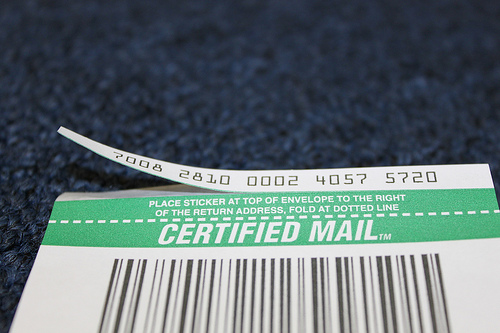When my clients exercise renewal rights in their leases, two things are crucial: exercising the option in a timely manner, and exercising the option precisely as required by the lease.
First, make sure you have the date to renew on your calendar. And on someone else’s calendar, as well. Don’t miss it or there will most likely be no forgiveness, especially in a market like this where there is not enough space, and soon tenants will be fighting over spaces and bidding up rents. Double check the deadline you’ve calculated – check it with your tenant rep broker or your attorney.
Second, give notice in the exact manner required by the lease! If your lease says you must give written notice, don’t give notice verbally. You must also read the notice requirements, which often say that notice must be sent in writing, by certified mail or nationally recognized overnight delivery service (such as FedEx, UPS, US Postal service). If overnight delivery is required, don’t email your renewal notice. It doesn’t matter what your landlord says, what matters is what’s written in the lease.

Clients often ask me something along these lines: “Do I really have to send a renewal notice by certified mail? The landlord said my email was good enough.” Being a former commercial litigation lawyer, I counsel my clients not to leave any room for interpretation when renewing. Landlords do not like giving renewal rights to begin with. We often have to fight to get them. When you do have renewal rights, follow the lease instructions to the letter (no pun intended)! If you don’t, you could have a big problem. Seek advice from your broker or lawyer if you are unsure on how to comply with the lease.
A recent article regarding a coffee shop in Downtown Miami that allegedly sent their renewal notice by email highlights the dangers. http://therealdeal.com/miami/2016/05/13/eternity-coffee-brews-legal-battle-with-downtown-miami-landlord/ The landlord in this case alleges that the tenant did not properly give notice to renew. The tenant believes that they have another 10 years of renewal term and that the landlord wants them out so they can redevelop the property. “The landlord…claimed that [the tenant’s emailed notice of] renewal in October, which read ‘We are planning to stay,’ was ‘very vague and not clear cut,’ the suit reads.” The parties are now tied up in litigation, which will almost certainly be extremely costly, and moreso for a tenant than a landlord.
Don’t fall into that trap! Pay attention to deadlines and required methods to give notice and seek guidance if you are unsure.

